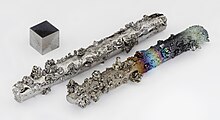Tarnish
Appearance


Tarnish is a layer of corrosion similar to rust. It is caused by oxidisation - when semi - reactive metals such as copper, brass, silver, or aluminum meet chemicals in the air. It will cause the metal to darken or go dull by making a thin film on the metal. It is caused by a chemical reaction, between a metal and a non metal (or compound), usually oxygen or sulphur dioxide.
References
[change | change source]- ↑ Bucki, James. "Coin Toning: Definition, Discussion and Effect on Value". The Spruce Crafts. Retrieved 1 April 2019.
